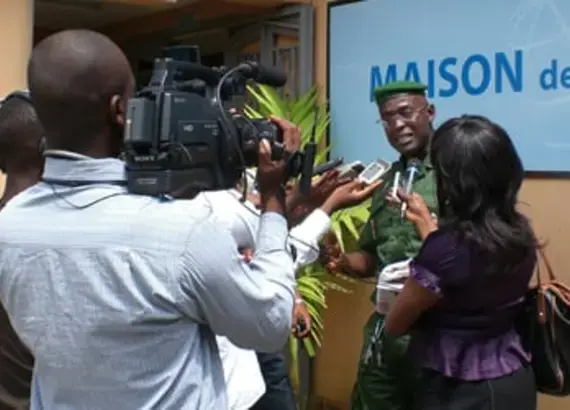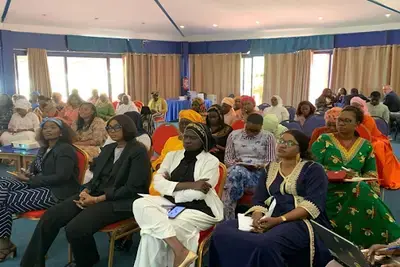
Success Story
WAEON Academy Addresses Role of Security Sector in Ensuring Peaceful and Credible Elections
As Guinea prepares for its first legislative elections since a 2008 military coup, the role of the nation’s security forces during the election period has come to the fore.
In 2010 Guineans participated in a democratic election that brought President Alpha Condé to power. Though the armed forces played a constructive role in providing security for that poll, a massacre in 2009, in which the military opened fire on unarmed civilian protesters, still weighs heavily on the minds of Guinean citizens.
To air these issues, high-level participants from the West Africa Election Observers Network (WAEON) and representatives of the security forces came together for a five-day training academy in Conakry Oct. 20-24 to discuss how to tackle security for the upcoming polls, which could occur as early as the first half of next year. Representatives from all of WAEON’s 11 member organizations, including its Guinean member, the Consortium for Domestic Election Observation (CODE), discussed the security sector’s role in ensuring peaceful and credible elections. And they exchanged experiences about the security sector’s involvement in electoral processes in Francophone and Anglophone West Africa. The academy was organized by WAEON in cooperation with NDI and CODE.
In televised remarks, Guinea’s Defense Minister, Maître Abdoul Kabélé Camara, and the Minister for Territorial Administration and Decentralization, Alhassane Condé, emphasized the need for civilians and the military to cooperate to ensure peaceful elections. NDI consultants and experts—including retired General Fernand Amoussou of Bénin, former commander of the United Nations Operation in Cote d’Ivoire (ONUCI) and an expert on the role of defense forces in democratic transitions, and Mustapha Abdallah, a researcher at the Koffi Annan International Peacekeeping Center in Accra, Ghana—covered practical strategies for improved collaboration between the civilian and security sectors. These included citizen observation plans that include regular and systematic communication with security forces.
During the training, WAEON held its first-ever public discussion forum on Oct. 23, inviting citizens to comment on the role of the security sector in keeping elections secure and credible. The forum, led by Dr. Chris Fomunyoh, NDI’s director of Central and West Africa programs, attracted nearly 100 representatives from civil society organizations, political parties, the security sector and the media, and was broadcast by major television and radio networks in Guinea. During the forum, General Amoussou said it was necessary for the military to remain neutral and subordinate to civilian authorities, urging his military colleagues to refrain from political or ethnic partisanship. He noted that members of the military and civilians are already working side by side in Guinea.
Many participants said that candid public exchanges like this one contribute to Guinea’s healing and reconciliation process. However, they also expressed concern about the security sector having enough resources—such as vehicles and gasoline—to assert their presence in remote areas to ensure peaceful elections across the country, not just in urban areas.
Another issue facing the country has been the delay in the legislative elections, a result of tensions surrounding the leadership of the National Independent Election Commission (CENI). Protests by opposition parties have called for the membership of the CENI to reflect changing alliances among ruling and opposition parties, as well as more transparency in organizing elections. A new law passed last September provides an equal number of committee seats for ruling and opposition parties and mandates that the head of the CENI is a member of civil society.
In connection with the academy, WAEON members visited several high-level organizations and government officials to discuss the make-up of the CENI and the reasons for the delayed legislative elections. They met with the multi-party Code of Conduct Monitoring Committee (CCMC); the Working Group of Women and Girls in Guinean Political Parties (CCFPPG); the National Transition Council (CNT); as well as the minister of territorial administration and General Ibrahima Baldé, commander of the National Police Force and Coordination of Special Forces for Securing the Elections (FOSSEPEL), who discussed lessons learned by the security sector during the 2010 presidential election.
At the end of the academy, WAEON released a statement commending Guinea’s government and people on the progress that has been made in strengthening their democracy, as well as the progress preparations for the next parliamentary elections.
Related:
Published Nov. 27, 2012



